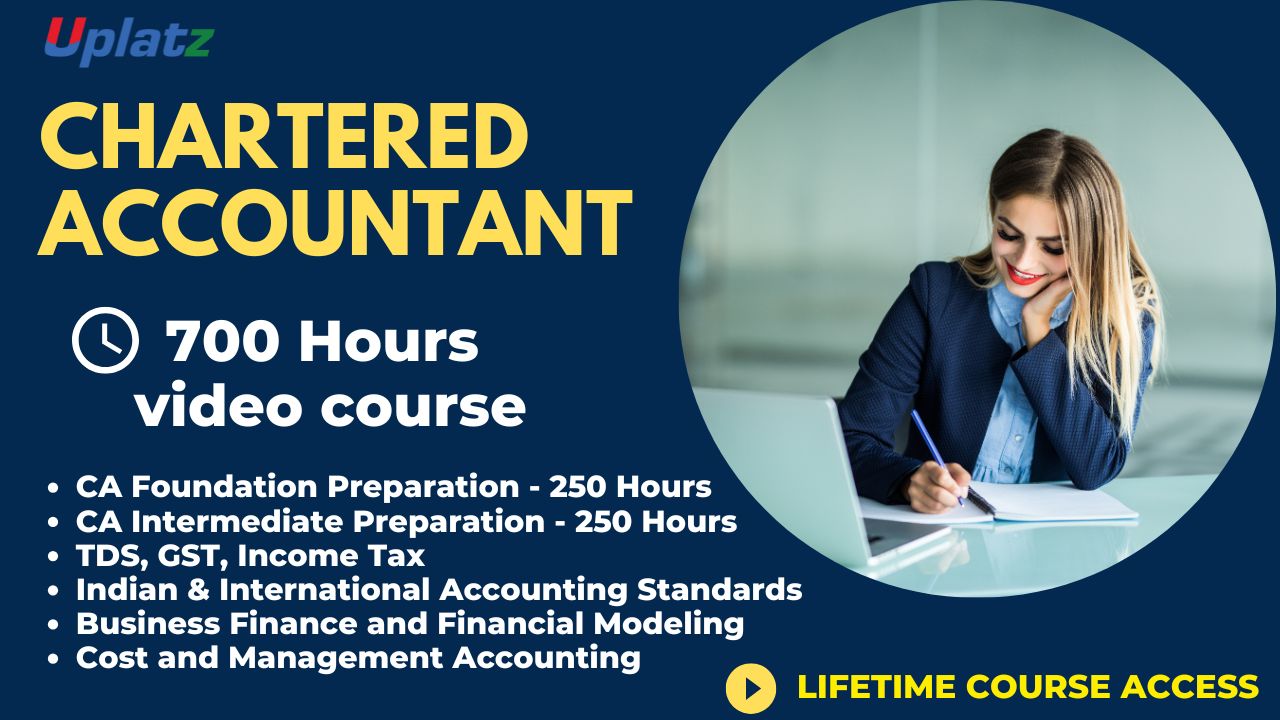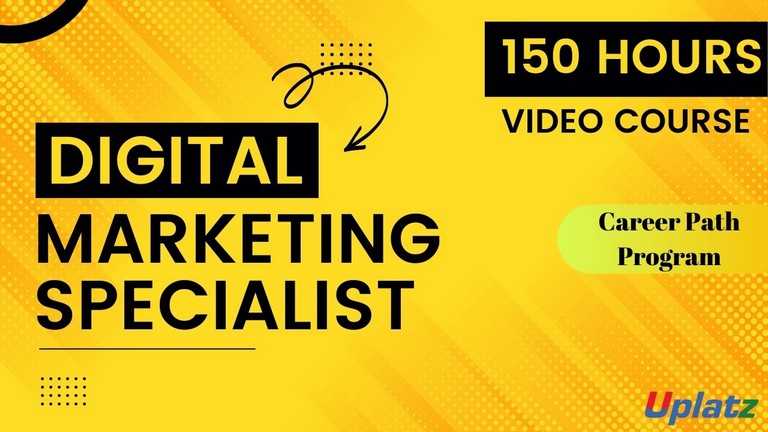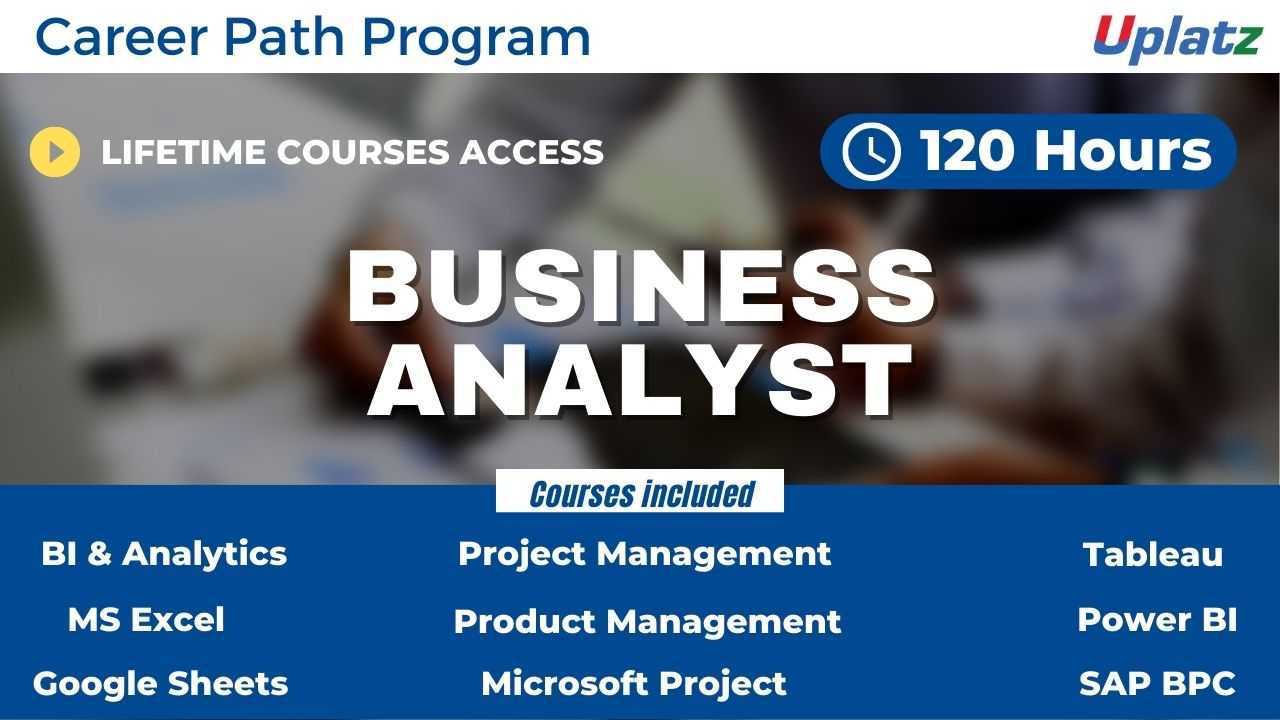Career Path - Project Manager
Learn Agile Project Management skills, track work to be completed, set deadlines and delegate tasks to your project team, identify any potential risksPreview Career Path - Project Manager course
Price Match Guarantee Full Lifetime Access Access on any Device Technical Support Secure Checkout Course Completion Certificate 71% Started a new career
BUY THIS COURSE (
71% Started a new career
BUY THIS COURSE (GBP 32 GBP 99 )-
 75% Got a pay increase and promotion
75% Got a pay increase and promotion
Students also bought -
-

- Career Path - Chartered Accountant
- 400 Hours
- GBP 32
- 1781 Learners
-

- Career Path - Digital Marketing Specialist
- 150 Hours
- GBP 32
- 1680 Learners
-

- Career Path - Business Analyst
- 120 Hours
- GBP 32
- 612 Learners

Courses included in Project Manager Career Path Program by Uplatz are:
1).Project Management Fundamentals
2).PRINCE2 Fundamentals
3).Product Management
4).Microsoft Project (beginner)
5).Microsoft Project (basic to advanced)
Project Management is one of the most intricate fields of work out there. There is no space for monotony in this vocation. A project manager (PM) is responsible for leading a complete project through initiation, planning, execution, control, and completion.
The roles of a project manager will include: taking part in the creation process, executing the project, preparing communication methods, finding solutions to recurring issues, monitoring the project’s progress from start to finish, ensure your team is actually getting things done, and many more. A project manager is responsible for connecting each project to the business world and to its clients.
Key roles & responsibilities of a project manager are:
1).Lead both your team members, such as those who report to you, as well as stakeholders on the project and communicate well to senior members of your team about the project’s status and what needs to be done next.
2).Manage risk and be adept at budgeting, scheduling, and planning to ensure the project stays on track and that it is finished on time and there are no project overruns.
3).Have expert knowledge of the industry you work in, as well as project management tools, techniques, and methodologies.
4).Follow a standard process, as defined by a professional project management organisation, such as the APM (Association for Project Management) or the PMI (Project Management Institute)
5).Initiate the project - check feasibility and work out budgets, teams and resources
6).Carry out planning - this will include setting goals and objectives, defining roles and producing schedules and timelines for tasks - in accordance with the needs of your client. Some tools, such as Gantt charts, can be used to create a visual project plan
7).Select, lead and motivate your project team from both internal and external stakeholder organisations
8).Manage the project - which includes coordinating the project team to keep them on track and keeping the project on budget
9).Perform monitoring and control activities in order to track the progress of the project
10).Identify and manage risks to ensure delivery is on time
11).Implement any necessary changes throughout the process
12).Report regularly to management and the client
13).Close the project - including evaluating successes and challenges to enhance learning for your next project.
Uplatz provides this end-to-end program on Project Management thus helping you pick up the track to become a successful Project Manager / Program Manager.
Course/Topic 1 - Project Management Fundamentals - all lectures
-
In this first video tutorial on Project Management, you will learn an Introduction to Project Management, its history, benefits, an illustration to Gantt Chart, a view on some of the International standards of practicing Project Management, an overview of what exactly is a project, its relationship with General Project Management practices, Triple Constraints Theory and the role of a Project Manager and its characteristics in Project Management.
-
In this second session of Project Management, you will understand what is Process Oriented Project Management, Project Processes and its categories, what is Project Management and Product Oriented processes and an overview of different process groups and its knowledge areas.
-
In this lecture, you will learn what is a process in Project Management and its different stages in a Project Life cycle, how a process is linked to different process groups. Also, you will learn about the different Knowledge Areas related to a Process in Project Management.
-
In this video, you will learn about the Project Planning Process and Group Processes and the different processes involved in managing the Scope and Scheduled Constraints.
-
In this last session on Project Management Fundamentals, you will learn about the different constraints involved like Cost, Quality, Resources, Risks, etc. in a Process Group and how it helps in managing the entire project in Project Management.
Course/Topic 2 - PRINCE2 Fundamentals - all lectures
-
Lecture 1 - Introduction to PRINCE2
-
Lecture 2 - PRINCE2 Principles
-
Lecture 3 - Aspects - Phases - Conclusion
Course/Topic 3 - Product Management - all lectures
-
Lecture 1 - Introduction to Product Management
-
Lecture 2 - Deep-dive into Product Management
Course/Topic 4 - Microsoft Project - all topics
-
Lecture 1 - Getting Started with Microsoft Project
-
Lecture 2 - Backstage
-
Lecture 3 - Modifying Project Information
-
Lecture 4 - Views and Tables
-
Lecture 5 - Preparation
-
Lecture 6 - Tasks
-
Lecture 7 - Task Notes
-
Lecture 8 - Work Resources
-
Lecture 9 - Material and Cost Resources
-
10 - Calendar Work Resource
Course/Topic 5 - Microsoft Project (basic to advanced) - all lectures
-
Lecture 1 - Overview of Microsoft Project
-
Lecture 2 - The Stage
-
Lecture 3 - The Back Stage
-
Lecture 4 - Views and Tables in MSP
-
Lecture 5 - Project Initiation - part 1
-
Lecture 6 - Project Initiation - part 2
-
Lecture 7 - Tasks and Milestones
-
Lecture 8 - Linking Tasks
-
Lecture 9 - More on Linking Tasks
-
Lecture 10 - Creating Resources
-
Lecture 11 - Creating Resources - advanced
-
Lecture 12 - Assigning Resources
-
Lecture 13 - Applying Cost Tables
-
Lecture 14 - Units Work Duration
-
Lecture 15 - Handy Features - revised
-
Lecture 16 - Critical Path Identification
-
Lecture 17 - Resource Leveling
-
Lecture 18 - Baselining
-
Lecture 19 - Updating Project - part 1
-
Lecture 20 - Updating Project - part 2
-
Lecture 21 - Updating Project - part 3
-
Lecture 22 - Monitoring
-
Lecture 23 - Controlling - part 1
-
Lecture 24 - Controlling - part 2
-
Lecture 25 - Reports Pack
-
Lecture 26 - Support EVM
The goals are:
1).To measure accuracy, productivity and success
2).To stick with the ethical standards and legal necessities
3).To maintain confidential information
4).To report any unethical behaviour and more
Course Syllabus: Career Path - Project Manager
Module 1:Introduction to Project Management
This module provides an overview of the project management profession, including key concepts, terminology, and the project lifecycle. Students will learn about the roles and responsibilities of a project manager and the importance of project management in achieving organizational goals.
Module 2:Project Initiation and Planning
Focusing on the initiation phase, this module covers the steps involved in defining project objectives, scope, and stakeholders. Students will learn to create project charters, establish project baselines, and develop a comprehensive project management plan that includes schedules, budgets, and resource allocations.
Module 3:Project Scheduling and Time Management
In this module, students will explore techniques for effective project scheduling. Topics will include creating Gantt charts, critical path analysis, and resource leveling. Students will learn how to manage timelines and ensure projects stay on track, using tools such as Microsoft Project or similar software.
Module 4:Budgeting and Cost Management
This module covers the fundamentals of budgeting and cost management in projects. Students will learn to estimate costs, develop budgets, and monitor expenditures. Topics will include cost control techniques and the importance of financial reporting in project management.
Module 5:Risk Management
Students will learn about the principles of risk management, including risk identification, analysis, and response planning. This module covers techniques for mitigating risks and implementing risk management strategies throughout the project lifecycle, emphasizing proactive decision-making.
Module 6:Quality Management
Focusing on quality assurance and quality control, this module explores methods for ensuring project deliverables meet established standards. Students will learn about quality planning, quality metrics, and techniques for continuous improvement, including Six Sigma and Total Quality Management (TQM).
Module 7:Team Dynamics and Leadership
In this module, students will explore the importance of team dynamics and leadership in project management. Topics will include team formation, motivation, conflict resolution, and effective communication strategies. Students will learn how to foster a collaborative team environment and lead diverse teams.
Module 8:Stakeholder Engagement and Communication
This module emphasizes the role of stakeholder management in project success. Students will learn how to identify and analyze stakeholders, manage expectations, and communicate effectively throughout the project lifecycle. Techniques for maintaining stakeholder relationships will be discussed.
Module 9:Agile Project Management
Focusing on Agile methodologies, this module introduces students to concepts such as Scrum, Kanban, and Lean project management. Students will learn how to apply Agile principles in project settings, manage iterative development, and facilitate Agile ceremonies.
Module 10:Monitoring and Controlling Projects
In this module, students will learn techniques for monitoring project performance and making necessary adjustments. Topics will include tracking project progress, reporting status to stakeholders, and using performance metrics to guide decision-making.
Module 11:Project Closure and Evaluation
This module covers the final stages of project management, including project closure processes and evaluation techniques. Students will learn how to conduct post-project reviews, document lessons learned, and ensure proper handover of project deliverables to stakeholders.
Module 12:Capstone Project
The course culminates in a capstone project where students will work in teams to develop a comprehensive project management plan for a hypothetical project. This project will require them to apply all concepts learned throughout the course, including planning, execution, and closure. Students will present their projects to peers and instructors for feedback.
Conclusion
This syllabus is designed to equip aspiring project managers with the knowledge and skills necessary to successfully lead projects across various industries. Through a combination of theoretical concepts and practical applications, students will be prepared to manage projects effectively, navigate challenges, and deliver successful outcomes.
The Project Manager Certification ensures you know planning, production and measurement techniques needed to stand out from the competition.
A project manager is the person responsible for leading a project from its inception to execution. This includes planning, execution and managing the people, resources and scope of the project.
A project manager usually reports to a manager, director, or vice president of project management although they can report to any manager in the hierarchy.
Product managers generally earn more than project managers. They also tend to oversee more higher-level decisions than project managers, making product managers the more senior position. You might see more variety in your work through project management, as you'll likely be assigned to several different projects.
You may not have all the skills right now, but with dedication, perseverance, and passion, anyone can learn to be an outstanding project manager. Based on our experience, we'll answer some questions you may have, whether you are a fresh graduate or someone in the early stages of their career.
Uplatz online training guarantees the participants to successfully go through the Project Manager Certification provided by Uplatz. Uplatz provides appropriate teaching and expertise training to equip the participants for implementing the learnt concepts in an organization.
Course Completion Certificate will be awarded by Uplatz upon successful completion of the Project Manager online course.
The Project Manager draws an average salary of $120.000 per year depending on their knowledge and hands-on experience.
Project management is definitely a good career with high salaries and plenty of variety at work, but it's also a demanding job that can be highly stressful at times.
Project Management Job Growth and Talent Gap 2017–2027. Demand over the next 10 years for project managers is growing faster than demand for workers in other occupations.
Essentially, a project manager who's qualified has the temperament, skills, and experience needed for the position. Typical requirements generally include at least three years of experience in a related role, the ability to communicate, formal training, and a PMP certification.
Note that salaries are generally higher at large companies rather than small ones. Your salary will also differ based on the market you work in.
1).Project Manager.
2).EUC Project Manager.
3).Project Management
Q1.How to define a project?
Ans-A project defines a set of task or activities commenced to create a product, services or results.
Q2.What is Project Management?
Ans-Project management is applying the knowledge & skills of the project team members comprising the project manager, application of tools and techniques available to make sure the assigned tasks are completed properly.
Q3.Define projects?
Ans-Projects are started for a specific or a set of related purposes.
Q4.Define Program?
Ans-A program is known as a set of projects managed in a synchronized manner to achieve the different parts of a goal.
Q5.Define Portfolio?
Ans-A portfolio refers to a collection of projects, programs and even other portfolios that is useful in an organization in order to achieve high business purpose.
Q6.Define stakeholder?
Ans-The stakeholder is any person, organization or an entity whose interest is affected, in a positive or negative manner, because of the project. The stakeholders influence is an important issue to take into consideration in any planning and then during execution of it as well.
Q7.Define organizational influences?
Ans-Every organization has a certain method of doing things, protocol about how things can best be done, etc. and these things certainly influences the planning and execution processes. These influences are taken into account when assessing, planning for activities related to projects. They are often mentioned as organizational environmental factors.
Q8.Define project life cycle?
Ans-A project has separate phases when the range of activities required to carry out the project work differ.
Q9. What is plan baselines?
Ans-Baselines are known as the final version of all plans before the project execution starts. Project baselines are the beginning versions of all related plans of a project, such as time schedule, the quality plan, the communication plan and more stuff related to project. This acts as the reference against which project performance is measured.
Q10.Define processes?
Ans-A process is a definite way of doing things. The process not only define the actions to be taken but also knows the sequence they have to be carried out.
Q11.Define Process Groups?
Ans-Process groups defines a set of processes that are applicable to various stages of a project.
Q12.What are the knowledge areas relevant to doing a project?
Ans-Scope management, time and cost management knowledge project integration knowledge area, Procurement and risk management areas are the vital support areas.
Q13.Expand RAID?
Ans-RAID also known as risks, assumptions, issues and dependencies.
Q14.Define SOW?
Ans-SOW also known as the statement of work refers to a detailed description of the outcomes of the project in terms of products, services or results are expected from the project.
Q15.What does Scope management contain?
Ans-The Scope management involves gathering requirements, defining scope, creating WBS, verifying scope and controlling the scope.









